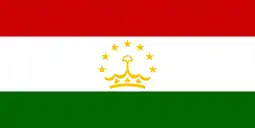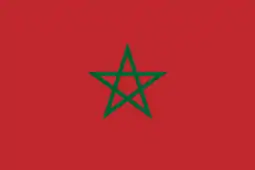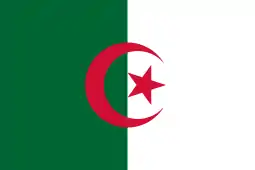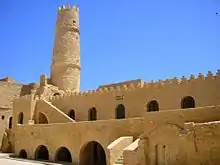Monastir, Tunisia
Monastir, also called Mistīr (Arabic: منستير ![]() Monastīr / Mistīr, from the Greek μοναστήριον "hermit's cell, monastery"), is a city on the central coast of Tunisia, in the Sahel area, some 20 kilometres (12 miles) south of Sousse and 162 kilometres (101 miles) south of Tunis. Traditionally a fishing port, Monastir is now a major tourist resort. Its population is about 93,306. It is the capital of Monastir Governorate.
Monastīr / Mistīr, from the Greek μοναστήριον "hermit's cell, monastery"), is a city on the central coast of Tunisia, in the Sahel area, some 20 kilometres (12 miles) south of Sousse and 162 kilometres (101 miles) south of Tunis. Traditionally a fishing port, Monastir is now a major tourist resort. Its population is about 93,306. It is the capital of Monastir Governorate.
Monastir
منستير | |
|---|---|
 Monastir from the ribat's tower | |
 Seal | |
 Monastir from space | |
 Monastir Location in Tunisia | |
| Coordinates: 35°46′10″N 10°49′10″E | |
| Country | |
| Governorate | Monastir |
| Population (2014) | |
| • Total | 93,306 |
| Time zone | UTC1 (CET) |
| ZIP code | 5000 |
| Area code(s) | 73 |
History
Monastir was founded on the ruins of the Punic–Roman city of Ruspina. The city features a well-preserved Ribat of Monastir that was used to scan the sea for hostile ships and as a defence against the attacks of the Byzantine fleet. Several ulema came to stay in the ribat of this peaceful city for contemplation. The ribat was, in the 1970s, also one of the filming locations for both the miniseries Jesus of Nazareth and Monty Python's Life of Brian. There are panoramic views of the city taken from a French naval intelligence airship in 1924.
Transportation
The city is on the electrified, metre-gauge Sahel Metro line with trains serving Sousse and Mahdia. Other services run to Tunis.
Monastir – Habib Bourguiba International Airport has flights from most Western European countries. It is run by Tepe Akfen Ventures Airport Holding (TAV).
Climate
Monastir enjoys a dry Mediterranean climate with hot summers, extremely mild winters, much sunshine and low rainfall year-round. The city sits in the northeast of Tunisia, on its central coast. It is milder than inland areas of Tunisia, forty percent of which is part of the Sahara. In the summer, while humidity is low, the soaring heat can still be hard to handle. The average high temperature of 29 °C (84 °F) in June skips past the 30 °C (86 °F) mark in the middle of the month and rises to 33 °C (91 °F) in July and August.
| Climate data for Monastir, Tunisia (1981–2010, extremes 1968–2017) | |||||||||||||
|---|---|---|---|---|---|---|---|---|---|---|---|---|---|
| Month | Jan | Feb | Mar | Apr | May | Jun | Jul | Aug | Sep | Oct | Nov | Dec | Year |
| Record high °C (°F) | 27.0 (80.6) |
31.1 (88.0) |
37.1 (98.8) |
37.5 (99.5) |
43.6 (110.5) |
47.0 (116.6) |
46.9 (116.4) |
47.0 (116.6) |
43.0 (109.4) |
39.5 (103.1) |
31.7 (89.1) |
29.7 (85.5) |
47.0 (116.6) |
| Average high °C (°F) | 16.5 (61.7) |
17.1 (62.8) |
19.1 (66.4) |
21.5 (70.7) |
25.1 (77.2) |
29.1 (84.4) |
32.3 (90.1) |
32.8 (91.0) |
29.7 (85.5) |
26.3 (79.3) |
21.5 (70.7) |
17.8 (64.0) |
24.1 (75.3) |
| Daily mean °C (°F) | 12.3 (54.1) |
12.9 (55.2) |
14.7 (58.5) |
16.9 (62.4) |
20.4 (68.7) |
24.2 (75.6) |
27.1 (80.8) |
27.8 (82.0) |
25.4 (77.7) |
22.2 (72.0) |
17.3 (63.1) |
13.6 (56.5) |
19.6 (67.2) |
| Average low °C (°F) | 8.2 (46.8) |
8.7 (47.7) |
10.6 (51.1) |
12.9 (55.2) |
16.3 (61.3) |
19.9 (67.8) |
22.5 (72.5) |
23.6 (74.5) |
21.6 (70.9) |
18.3 (64.9) |
13.2 (55.8) |
9.4 (48.9) |
15.4 (59.8) |
| Record low °C (°F) | 0.2 (32.4) |
0.1 (32.2) |
1.9 (35.4) |
4.5 (40.1) |
8.2 (46.8) |
12.4 (54.3) |
15.1 (59.2) |
14.3 (57.7) |
13.9 (57.0) |
7.3 (45.1) |
0.2 (32.4) |
−1.9 (28.6) |
−1.9 (28.6) |
| Average precipitation mm (inches) | 44.6 (1.76) |
25.0 (0.98) |
30.4 (1.20) |
21.1 (0.83) |
17.4 (0.69) |
4.9 (0.19) |
1.6 (0.06) |
10.1 (0.40) |
46.6 (1.83) |
54.6 (2.15) |
38.0 (1.50) |
45.0 (1.77) |
339.3 (13.36) |
| Average precipitation days (≥ 1.0 mm) | 5.0 | 4.2 | 4.1 | 4.4 | 3.0 | 1.3 | 0.4 | 1.2 | 3.7 | 4.6 | 4.1 | 4.3 | 40.3 |
| Average relative humidity (%) | 70 | 69 | 70 | 69 | 69 | 67 | 65 | 66 | 70 | 71 | 70 | 71 | 69 |
| Mean monthly sunshine hours | 167.4 | 179.2 | 207.7 | 228.0 | 275.9 | 303.0 | 337.9 | 303.8 | 240.0 | 210.8 | 189.0 | 164.3 | 2,807 |
| Source: Institut National de la Météorologie (precipitation days/humidity/sun 1961–1990)[1][2][3][note 1] | |||||||||||||
Economy
Nouvelair has its head office in Monastir in the Dkhila Tourist Zone,[5][6] near the Hôtel Sahara Beach.[7]
Education
The city of Monastir has:
- Five Junior High Schools of basic education: Ali-Bourguiba, Moufida-Bourguiba Imtiez, Salem-Bchir and a pioneer junior high school;
- Four High Schools: Fatouma-Bourguiba, Hedi-Khefacha, Bourguiba and a Pioneer high school (open since the school year 2003-2004).
Monastir is also a university city, incorporating the University of Monastir which was founded on September 2, 2004[8] and covers the governorates of Monastir and Mahdia. The university of Monastir includes sixteen faculty departments, of which ten are located in Monastir:
- Faculty of science
- Faculty of medicine
- Faculty of dental medicine
- Faculty of pharmacy
- The National Engineering School of Monastir
- The Higher School of science and technologies of health
- The Higher Institutes of Biotechnology, Computer Science and Mathematics and Fashion Trades
- The Preparatory Institute for Engineering Studies
The student population of Monastir exceeded 27,000 in 2007–2008, making the city one of the largest in terms of university studies along with Tunis, Sfax and Sousse.
Notable people
Tunisian ex-president Habib Bourguiba was born in Monastir, and his mausoleum is located in the city. Many other famous politicians are also from Monastir:
- Mohamed Mzali, prime minister of Tunisia from 1980 to 1986
- Hedi Amara Nouira, prime minister of Tunisia from 1970 to 1980
Among other notable people:
- Jawhar Mnari, footballer, born in Monastir and winner of DFB-Pokal (2006/2007).
- Hamza Younés, footballer
Twin towns – sister cities
 Dushanbe, Tajikistan
Dushanbe, Tajikistan Manisa, Turkey
Manisa, Turkey Münster, Germany
Münster, Germany Saint-Étienne, France
Saint-Étienne, France Tétouan, Morocco
Tétouan, Morocco Tizi Ouzou, Algeria
Tizi Ouzou, Algeria
Gallery
|
Neighbouring area
Monastir's northeastern territories lead into a place called Route de la Falaise, through which one can reach its most notable suburb, Skanes, which is 6 miles (9.7 kilometres) from Monastir's town centre. Hugging Tunisia's coastline, Skanes is a holiday resort known mostly for its professional golf courses; white, sandy beaches; clear blue sea; and hotels that fuse Moorish architecture with modern designs. It is frequented throughout the summer by tourists from around the world. They also come for the medina, where it is possible to sample fresh Tunisian cooking and bargain for local goods.
References
- "Les normales climatiques en Tunisie entre 1981 2010" (in French). Ministère du Transport. Archived from the original on 19 December 2019. Retrieved 3 January 2020.
- "Données normales climatiques 1961-1990" (in French). Ministère du Transport. Archived from the original on 21 December 2019. Retrieved 3 January 2020.
- "Les extrêmes climatiques en Tunisie" (in French). Ministère du Transport. Archived from the original on 21 December 2019. Retrieved 3 January 2020.
- "Réseau des stations météorologiques synoptiques de la Tunisie" (in French). Ministère du Transport. Retrieved 3 January 2020.
- "Réclamations, Suggestions." Nouvelair. Retrieved on 1 July 2010. "Nos Coordonnées Adresse : Zone Touristique Dkhila – 5065 – Monastir – Tunisie."
- "Après le vol." Nouvelair. Retrieved on 1 July 2010.
- Jacobs, Daniel and Peter Morris. The Rough Guide to Tunisia. Rough Guides, 2001. 215. Retrieved from Google Books on 1 July 2010. ISBN 1-85828-748-0, ISBN 978-1-85828-748-5.
- "History : university of monastir". www.um.rnu.tn. Archived from the original on 2017-11-09. Retrieved 2018-06-04.
- "العلاقات الخارجية و المدن المتوأمة". commune-monastir.gov.tn (in Arabic). Monastir. Retrieved 2021-01-19.
Notes
- The Station ID for Monastir is 340404111.[4]
External links
| Wikivoyage has a travel guide for Monastir. |
| Wikimedia Commons has media related to Monastir. |
- (in French) USMonastir.com, official web site of the local multi-sports team
- Photo gallery of the city of Monastir by French naval intelligence in 1924.






